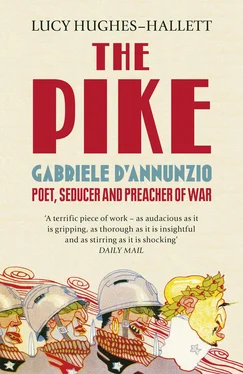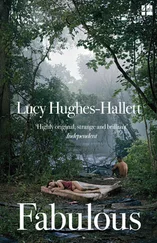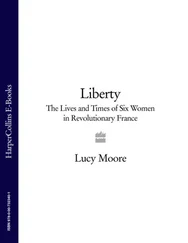From Miraglia, d’Annunzio learned that a bombing raid on Trieste had been proposed. Trieste, the cosmopolitan city at the head of the Adriatic, then Austria’s chief port, was one of the irredentists’ most yearned-after lost territories. Here was an exploit exactly to d’Annunzio’s taste. He was an aviator. Venice and Trieste are barely 150 kilometres apart, a short hop for a modern plane, but in 1915 a formidable distance. As a showman d’Annunzio saw how the flight could become a piece of splendidly theatrical propaganda. He determined to claim it for himself. He and Miraglia would drop explosives on the Austrian emplacements in the harbour but – more importantly as far as d’Annunzio was concerned – they would also drop pamphlets (written, of course, by himself) over the town’s main squares.
With Miraglia he began to talk of ways and means. He studied maps of the coastline they would overfly. He thought about the best design for the little sandbags to which the leaflets would be attached, and went himself to the Rialto market to buy the necessary canvas. He reflected happily that, thanks to his rigorous programme of exercise followed over many years, he was more than fit enough for the physical ordeal of the flight and confident of being able to hurl bombs or sandbags from the unstable perch of a tiny plane. He drafted a message to ‘the Italians of Trieste’, assuring them of his devotion to the cause of their imminent liberation, and copied it out over and over again in his own hand, taking care that his signature (often an exquisite but illegible arabesque) should be unmistakably clear.
Word got out, and reached a reporter. Anything d’Annunzio did was not only a gossip column item, but a news story. A Venetian journal announced the projected flight, and that the poet was to join it. The admiral commanding the tiny air force was doubly dismayed, firstly by the breach of security – clearly it was going to be hard to keep any operation in which d’Annunzio was involved secret from the enemy – secondly, by the risk of this inconveniently famous subordinate getting himself killed. D’Annunzio alive could help to encourage the troops and, if he continued to produce the kind of furiously nationalist poetry that he had been writing over the previous decade, help maintain the civilian population’s support for the war. His death, on the other hand, would have a deleterious effect on the entire nation’s morale.
The admiral vetoed the flight. D’Annunzio protested. The admiral consulted his superiors. Telegrams went back and forth between Rome and Venice and the military headquarters near the front at Udine. None of the authorities wanted to sanction the flight. The order came down: d’Annunzio’s life was ‘preciosissimo’ and must be conserved. He was forbidden to join this or any other dangerous operation. Furious, d’Annunzio went to the top. On 29 July he wrote an impassioned letter to Prime Minister Salandra.
He flattered: ‘You, whose own spirit is so hard-working and so generous, must understand me.’ He stressed his physical competence. He was not ‘a man of letters of the old type, in skull cap and slippers’. He was an adventurer. ‘My whole life has been a risky game.’ He boasted of his past daring. ‘I have exposed myself to danger a thousand times against the fences and hedges of the Roman Campagna’ (he adored fox-hunting). In France he had often been out on the Atlantic in chancy weather ‘as the fishermen of the Landes could tell you’. He had ventured repeatedly into enemy territory on the Western Front (he visited the front twice, staying on the safer side of the French lines). Most importantly, ‘I am an aviator … I have flown many times at high altitude.’ (This wasn’t strictly true either.) And he wasn’t only brave: he had knowledge and skills which could be useful. He knew Istria, he knew Trieste. He had an ‘observant spirit’.
Having presented his credentials, he made his request, in the most insistent terms. ‘I pray, I beg … repeal this odious veto.’ He hinted that if he were not allowed to risk his life in his own way he would deliberately endanger it by going straight to the front. To bar one with ‘my past, my future’ from living the heroic life would be ‘to cripple me, to mutilate me, to reduce me to nothing’. The troops, the press, the people of Italy all saw him as ‘the poet of the war’ – now the authorities were trying to treat him as an exhibit in a museum.
Minister Martini scoffed at the suggestion that fox-hunting and jaunts in pleasure boats provided the necessary experience for the kind of role d’Annunzio was claiming. But Salandra was impressed by d’Annunzio’s earnest tone. The ban was lifted. The flight would go ahead.
Exultant, d’Annunzio went shopping again. At the haberdashers he chose ribbons (red, white and green, the colours of the Italian flag) with which to adorn his missives to the people of Trieste. He filched a sandbag from among those banked up along the façade of St Mark’s. Its contents, sanctified by contact with the ancient building, the hub of the Venetian Empire, would give his little packets historical gravity as well as physical weight. He bought himself thick woollen vests and long johns and when all was ready, all the little bags stowed away in one big one, he danced ‘a pyrrhic dance of joy around them’.
The date of the enterprise was fixed for 7 August, which d’Annunzio considered an auspicious date. He prepared himself – as was only realistic in those early days of flying – for death. He would write a few months later about the mornings on which he set out for such missions, ‘the thought of returning was left in the vestibule, despised, as a vile encumbrance’, and recall how he sat once with a pilot before a flight, talking easily about routes and equipment, but aware that ‘each of us, by noon, could be a fistful of charred flesh, a crushed skull with gold teeth glinting in the mess’. He drew up a will, and entrusted it to Albertini.
On 6 August he and Miraglia made a test flight. D’Annunzio had flown before, but only rising briefly over airfields. Now he looked down on a great city, seeing Venice as only a handful of human beings had ever yet seen it. He was the first writer to record the experience. He wore, as all the aviators did, heavy leather gloves. When he took one off to help Miraglia tighten the elastic of his chinstrap he at once felt his fingers begin to freeze. All the same, belted into the forward seat, exposed to every wind in the shaky little flying machine, he persistently scribbled down his impressions. The diverging lines of a ship’s wake were like ‘the palms in the hand of Victory’. Venice’s islands, divided up by canals, resembled the segments of a loaf of bread. The long railway bridge was the stem to the city’s flower. The wind-ruffled water by the lagoon’s outlet was iridescent as a pigeon’s throat. The mainland – in August’s dryness – was blonde, feminine, girdled by the pale ribbons of dykes. Avidly absorbing these new sights, fixing them with similes, d’Annunzio makes no mention of discomfort, or vertigo or fear.
On the morning of the seventh he performed his usual toilette – a vigorous massage administered by his servant followed by a bath – and thought about the possibility that the body he was tending might, by nightfall, be stripped and laid out dead. After breakfast (strong coffee) he went shopping again, for another woollen jumper: he must have felt the cold the day before. Walking back towards the Hotel Danieli he encountered the Countess Morosini, with her daughter, the Countess di Robilant. It is one of the oddities of d’Annunzio’s war experience that on his way into action of the most serious kind he might find himself chatting with an acquaintance about a social engagement. Annina Morosini, known to the gossip columns as the ‘uncrowned Queen of Venice’, was the chatelaine of the Palazzo da Mula on the Grand Canal and a generous friend to the poet. That morning he noticed how lovely her eyes were, and jotted in his notebook ‘still desirable’ (she was fifty-one). He told her what he was about to do and asked her playfully to give him a talisman. She demurred, offering him only her blessing, but saying she would telephone that evening. He was offhand about the latter promise. ‘I don’t know what she’s calling for,’ he noted. Given his thoughts at bathtime, the coming evening must have seemed remote. Back in his hotel room he filled a cigarette case with cartridges, laid out his woollen flying gear and wondered: ‘Will it be cold up there, or down there?’ (The underlining is his.) He was thinking of the sea bed. Remembering that he might not die but be taken prisoner, he put six of the laxative tablets he swore by, and some cash, in his pocket, then went down and took the waiting gondola to the airfield. Miraglia was ready for him. They set off on the flight which would take them further than any Italian pilot had flown before, and well within range of enemy guns.
Читать дальше












